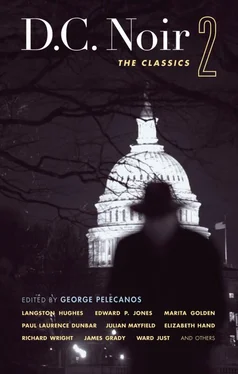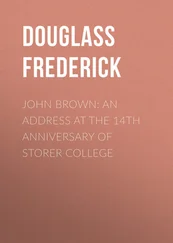Perhaps five years passed. The business of hunting a job or something or other had bruised my vanity so that I could recognize it. I felt old. Avey and my real relation to her, I thought I came to know. I wanted to see her. I had been told that she was in New York. As I had no money, I hiked and bummed my way there. I got work in a ship-yard and walked the streets at night, hoping to meet her. Failing in this, I saved enough to pay my fare back home. One evening in early June, just at the time when dusk is most lovely on the eastern horizon, I saw Avey, indolent as ever, leaning on the arm of a man, strolling under the recently lit arc-lights of U Street. She had almost passed before she recognized me. She showed no surprise. The puff over her eyes had grown heavier. The eyes themselves were still sleepy-large, and beautiful. I had almost concluded — indifferent. “You look older,” was what she said. I wanted to convince her that I was, so I asked her to walk with me. The man whom she was with, and whom she never took the trouble to introduce, at a nod from her, hailed a taxi, and drove away. That gave me a notion of what she had been used to. Her dress was of some fine, costly stuff. I suggested the park, and then added that the grass might stain her skirt. Let it get stained, she said, for where it came from there are others.
I have a spot in Soldier’s Home to which I always go when I want the simple beauty of another’s soul. Robins spring about the lawn all day. They leave their footprints in the grass. I imagine that the grass at night smells sweet and fresh because of them. The ground is high. Washington lies below. Its light spreads like a blush against the darkened sky. Against the soft dusk sky of Washington. And when the wind is from the South, soil of my homeland falls like a fertile shower upon the lean streets of the city. Upon my hill in Soldier’s Home. I know the policeman who watches the place of nights. When I go there alone, I talk to him. I tell him I come there to find the truth that people bury in their hearts. I tell him that I do not come there with a girl to do the thing he’s paid to watch out for. I look deep in his eyes when I say these things, and he believes me. He comes over to see who it is on the grass. I say hello to him. He greets me in the same way and goes off searching for other black splotches upon the lawn. Avey and I went there. A band in one of the buildings a fair distance off was playing a march. I wished they would stop. Their playing was like a tin spoon in one’s mouth. I wanted the Howard Glee Club to sing “Deep River,” from the road. To sing “Deep River, Deep River,” from the road… Other than the first comments, Avey had been silent. I started to hum a folk-tune. She slipped her hand in mine. Pillowed her head as best she could upon my arm. Kissed the hand that she was holding and listened, or so I thought, to what I had to say. I traced my development from the early days up to the present time, the phase in which I could understand her. I described her own nature and temperament. Told how they needed a larger life for their expression. How incapable Washington was of understanding that need. How it could not meet it. I pointed out that in lieu of proper channels, her emotions had overflowed into paths that dissipated them. I talked, beautifully I thought, about an art that would be born, an art that would open the way for women the likes of her. I asked her to hope, and build up an inner life against the coming of that day. I recited some of my own things to her. I sang, with a strange quiver in my voice, a promise-song. And then I began to wonder why her hand had not once returned a single pressure. My old-time feeling about her laziness came back. I spoke sharply. My policeman friend passed by. I said hello to him. As he went away, I began to visualize certain possibilities. An immediate and urgent passion swept over me. Then I looked at Avey. Her heavy eyes were closed. Her breathing was as faint and regular as a child’s in slumber. My passion died. I was afraid to move lest I disturb her. Hours and hours, I guess it was, she lay there. My body grew numb. I shivered. I coughed. I wanted to get up and whittle at the boxes of young trees. I withdrew my hand. I raised her head to waken her. She did not stir. I got up and walked around. I found my policeman friend and talked to him. We both came up, and bent over her. He said it would be all right for her to stay there just so long as she got away before the workmen came at dawn. A blanket was borrowed from a neighbor house. I sat beside her through the night. I saw the dawn steal over Washington. The Capitol dome looked like a gray ghost ship drifting in from sea. Avey’s face was pale, and her eyes were heavy. She did not have the gray crimson-splashed beauty of the dawn. I hated to wake her. Orphan-woman…
Trouble with the Angels
by Langston Hughes
(Originally published in 1935)
National Theatre
At every performance lots of white people wept. And almost every Sunday while they were on tour some white minister invited the Negro actor who played God to address his congregation and thus help improve race relations — because almost everywhere they needed improving. Although the play had been the hit of the decade in New York, its Negro actors and singers were paid much less than white actors and singers would have been paid for performing it. And, although the white producer and his backers made more than half a million dollars, the colored troupers on tour lived in cheap hotels and often slept in beds that were full of bugs. Only the actor who played God would sometimes, by the hardest, achieve accommodations in a white hotel, or be put up by some nice white family, or be invited to the home of the best Negroes in town. Thus God probably thought that everything was lovely in the world. As an actor he really got very good write-ups in the papers.
Then they were booked to play Washington, and that’s where the trouble began. Washington, the capital of the United States, is, as every Negro knows, a town where no black man was allowed inside a downtown theater, not even in the gallery, until very recently. The legitimate playhouses had no accommodations for colored people. Incredible as it may seem, until Ingrid Bergman made her stand, Washington was worse than the Deep South in that respect.
But God wasn’t at all worried about playing Washington. He thought surely his coming would improve race relations. He thought it would he fine for the good white people of the Capital to see him — a colored God — even if Negroes couldn’t. Not even those Negroes who worked for the government. Not even the black congressman.
But several weeks before the Washington appearance of the famous “Negro” play about charming darkies who drank eggnog at a fish fry in heaven, storm clouds began to rise. It seemed that the Negroes of Washington strangely enough had decided that they, too, wanted to see this play. But when they approached the theater management on the question, they got a cold shoulder. The management said they didn’t have any scats to sell Negroes. They couldn’t even allot a corner in the upper gallery — there was such a heavy ticket demand from white folks.
Now this made the Negroes of Washington mad, especially those who worked for the government and constituted the best society. The teachers at Howard got mad, too, and the ministers of the colored churches who wanted to see what a black heaven looked like on the stage.
But nothing doing! The theater management was adamant. They really couldn’t sell seats to Negroes. Although they had no scruples about making a large profit on the week’s work of Negro actors, they couldn’t permit Negroes to occupy seats in the theater.
So the Washington Negroes wrote directly to God, this colored God who had been such a hit on Broadway. They thought surely he would help them. Several organizations, including the Negro Ministerial Alliance, got in touch with him when he was playing Philadelphia. What a shame, they said by letter, that the white folks will not allow us to come to see you perform in Washington. We are getting up a protest. We want you to help us. Will you?
Читать дальше











